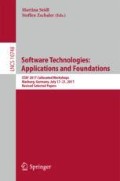Abstract
Executable domain-specific modeling languages (xDSMLs) have the potential of bringing major benefits to the development of complex software-intensive systems as they provide abstractions of complex system behaviors and allow for early analyses of that behavior. However, in order to be useful, xDSMLs have to be equipped with model analysis tools supporting domain engineers in comprehending, exploring, and analyzing modeled behaviors. Hand-crafting such tools in an ad hoc manner imposes significant efforts and costs on the development process and is, hence, mostly done for broadly adopted xDSML only. Executable metamodeling approaches seek to overcome this limitation by providing formalisms to define the execution semantics of xDSMLs in a systematic way building the basis for automatically generating model analysis tools. While significant advances towards achieving this vision have been achieved in recent years, there are still many challenges to be solved for generating out-of-the-box analysis support for xDSMLs. In this paper we revisit the tool generation challenge introduced by Bryant et al. [3] seven years ago reflecting on recent achievements and identifying open challenges.
Access this chapter
Tax calculation will be finalised at checkout
Purchases are for personal use only
References
Bandener, N., Soltenborn, C., Engels, G.: Extending DMM behavior specifications for visual execution and debugging. In: Malloy, B., Staab, S., van den Brand, M. (eds.) SLE 2010. LNCS, vol. 6563, pp. 357–376. Springer, Heidelberg (2011). https://doi.org/10.1007/978-3-642-19440-5_24
Bousse, E., Corley, J., Combemale, B., Gray, J.G., Baudry, B.: Supporting efficient and advanced omniscient debugging for xDSMLs. In: Proceedings of the 2015 ACM SIGPLAN International Conference on Software Language Engineering (SLE 2015), pp. 137–148. ACM (2015)
Bryant, B.R., Gray, J., Mernik, M., Clarke, P.J., France, R.B., Karsai, G.: Challenges and directions in formalizing the semantics of modeling languages. Comput. Sci. Inf. Syst. 8(2), 225–253 (2011)
Chiş, A., Denker, M., Gîrba, T., Nierstrasz, O.: Practical domain-specific debuggers using the moldable debugger framework. Comput. Lang. Syst. Struct. 44(PA), 89–113 (2015)
Combemale, B., Crégut, X., Garoche, P.-L., Thirioux, X.: Essay on semantics definition in MDE - an instrumented approach for model verification. J. Softw. 4(9), 943–958 (2009)
Durán, F., Moreno-Delgado, A., Orejas, F., Zschaler, S.: Amalgamation of domain specific languages with behaviour. J. Log. Algebr. Methods Program. 86(1), 208–235 (2017)
Hutchinson, J., Whittle, J., Rouncefield, M., Kristoffersen, S.: Empirical assessment of MDE in industry. In: Proceedings of the 33rd International Conference on Software Engineering (ICSE 2011), pp. 471–480. ACM (2011)
Kleppe, A.: Software Language Engineering: Creating Domain-Specific Languages Using Metamodels. Addison-Wesley, Boston (2008)
Kühne, T.: Matters of (meta-)modeling. Softw. Syst. Model. 5(4), 369–385 (2006)
Lindeman, R.T., Kats, L.C., Visser, E.: Declaratively defining domain-specific language debuggers. In: Proceedings of the 10th International Conference on Generative Programming and Component Engineering (GPCE 2011), pp. 127–136. ACM (2011)
MathWorks. Simulink. https://www.mathworks.com/products/simulink.html
Meyers, B., Denil, J., Dávid, I., Vangheluwe, H.: Automated testing support for reactive domain-specific modelling languages. In: Proceedings of the 2016 ACM SIGPLAN International Conference on Software Language Engineering (SLE 2016), pp. 181–194. ACM (2016)
Meyers, B., Deshayes, R., Lucio, L., Syriani, E., Vangheluwe, H., Wimmer, M.: ProMoBox: a framework for generating domain-specific property languages. In: Combemale, B., Pearce, D.J., Barais, O., Vinju, J.J. (eds.) SLE 2014. LNCS, vol. 8706, pp. 1–20. Springer, Cham (2014). https://doi.org/10.1007/978-3-319-11245-9_1
Object Management Group: OMG Unified Modeling Language (OMG UML), Version 2.5, September 2013. http://www.omg.org/spec/UML/2.5
Pavletic, D., Voelter, M., Raza, S.A., Kolb, B., Kehrer, T.: Extensible debugger framework for extensible languages. In: de la Puente, J.A., Vardanega, T. (eds.) Ada-Europe 2015. LNCS, vol. 9111, pp. 33–49. Springer, Cham (2015). https://doi.org/10.1007/978-3-319-19584-1_3
Ráth, I., Vago, D., Varró, D.: Design-time simulation of domain-specific models by incremental pattern matching. In: Proceedings of the 2008 IEEE Symposium on Visual Languages and Human-Centric Computing (VL/HCC 2008), pp. 219–222. IEEE Computer Society (2008)
Schmidt, D.C.: Model-driven engineering. IEEE Comput. 39, 25–31 (2006)
Tikhonova, U.: Reusable specification templates for defining dynamic semantics of DSLs. Softw. Syst. Model. 1–30 (2017). https://doi.org/10.1007/s10270-017-0590-0
Tikhonova, U., Manders, M., Boudewijns, R.: Visualization of formal specifications for understanding and debugging an industrial DSL. In: Milazzo, P., Varró, D., Wimmer, M. (eds.) STAF 2016. LNCS, vol. 9946, pp. 179–195. Springer, Cham (2016). https://doi.org/10.1007/978-3-319-50230-4_13
Wu, H., Gray, J., Mernik, M.: Grammar-driven generation of domain-specific language debuggers. J. Softw.: Pract. Exp. 38(10), 1073–1103 (2008)
Acknowledgement
This work is funded by the Austrian Agency for International Mobility and Cooperation in Education, Science and Research (OeAD) on behalf of the Federal Ministry for Science, Research and Economy (BMWFW) under the grand number FR 08/2017, and by the French Ministries of Foreign Affairs and International Development (MAEDI) and the French Ministry of Education, Higher Education and Research (MENESR).
Author information
Authors and Affiliations
Corresponding author
Editor information
Editors and Affiliations
Rights and permissions
Copyright information
© 2018 Springer International Publishing AG
About this paper
Cite this paper
Mayerhofer, T., Combemale, B. (2018). The Tool Generation Challenge for Executable Domain-Specific Modeling Languages. In: Seidl, M., Zschaler, S. (eds) Software Technologies: Applications and Foundations. STAF 2017. Lecture Notes in Computer Science(), vol 10748. Springer, Cham. https://doi.org/10.1007/978-3-319-74730-9_18
Download citation
DOI: https://doi.org/10.1007/978-3-319-74730-9_18
Published:
Publisher Name: Springer, Cham
Print ISBN: 978-3-319-74729-3
Online ISBN: 978-3-319-74730-9
eBook Packages: Computer ScienceComputer Science (R0)

